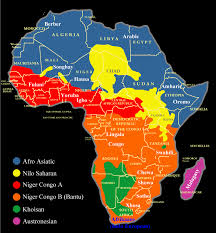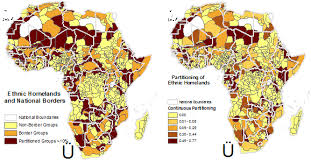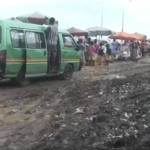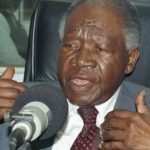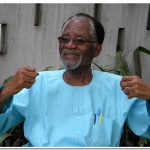Partitioned Africa
Posted by By Akogun Akomolafe at 22 April, at 09 : 08 AM Print
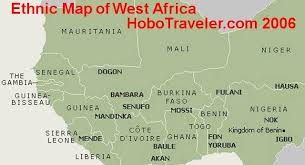
Warning: count(): Parameter must be an array or an object that implements Countable in /home/alaye/public_html/wp-content/themes/Video/single_blog.php on line 56
(edited by A.I. Asiwaju, University of Lagos Press, 1985.)
Femi’s note: Partitioned Africa is copyrighted material. I did not write it. I use it to educate Africans about the evils of not knowing our history and how connected we are.
“The other side of the African perspective relates to the attitude in particular African culture areas or ethnic groups which were more immediately affected by the political surgery by being split into two or more colonies and, later, independent African successor-states. . .: the Somali whose essentially continuous culture area was severed into the separate colonies of British Somaliland, French Somaliland, Italian Somaliland, the Northern Frontier District of Kenya and the Ogaaden province of Imperial Ethiopia; the Masai, cut nearly in half by the Kenya-Tanzania border; the Bakongo across the Gabon-Congo, Congo-Zaire and Zaire-Angola boundaries; the Lunda astride the Zaire-Angola and Zaire-Zambia frontiers; the Zande or the Azande cut by boundaries into different parts in the Sudan, Chad, the Central African Republic and Zaire; the Yoruba and the Aja, each divided between Nigeria, Benin (formerly Dahomey) and Togo; the Gourma truncated into parts located in Upper Volta, Togo and Benin; the Wolof and the Serers of Senegal and the Gambia; the Sounike and the Tukulor across the Senegal-Mauritania boundary; the Tubu mutilated by the Libyan-Chad and Chad-Niger borders; the Nubians across the Egypt-Sudan boundary; the Tswana on both sides of the Botswana-South Africa boundary and the cattle-keeping Ova Herero as well as the game-seeking Khoisan Basarwa (the so-called ‘Bushmen’) astride the Botswana-Namibia border.
In these specifically divided African culture areas, the boundaries have been drawn across well-established lines of communication including, in every case, a dormant or active sense of community based on traditions concerning common ancestry, usually very strong kinship ties, shared socio-political institutions and economic resources, common customs and practices, and sometimes acceptance of a common political control. In many instances, such as the Uganda-Sudan frontier through the Kakwa territory, the boundaries have separated communities of worshippers from age-old sacred groves and shrines. In other instances, well exemplified by the Somali, the water resources in a predominantly pastoral and nomadic culture area were located in one state while the pastures were in another.
Apart from the division which arises routinely from the mere location of boundaries, partitioned groups were further pulled apart in consequence of the opposing integrative processes set in motion by the different states. Such processes have tended to make the divided groups look in different political, economic and social directions. This has generally been the effect on the partitioned culture areas of the distinct policies which the various states pursue in matters of trade and currency, transport and communication, politics and administration, ideology and education. Different symbols of formal status, above all citizenship, are imposed on the same people.
At the local levels, a manifestation of the effort to emphasize separatism has been the systematic application of different cover-names for the same people to distinguish between those on different sides of particular inter-state boundaries. This phenomenon often dates back to the establishment of boundaries themselves. It is especially manifest in regions like West Africa where the two sides of a boundary might fall respectively under the control of different colonial powers, each imposing its own metropolitan culture and particularly its language and orthographic tradition.
Thus for the people who were called Yoruba in British Nigeria, the name in French Dahomey (now Benin) is ‘Nago’, which sometimes assumes the characteristic masculine and feminine forms of ‘Nagots’ and ‘Nagottes’. Other examples, again in relation to Nigeria, are the Gude, the Higis and the Matakam who on the Cameroonian side of the common border in the area of the ancient state of Mandara came to be called respectively the ‘Djimi’, the ‘Kapsiki’ and the ‘Wula’. Other examples include Kpelle and the Loma in Liberia, referred to respectively as the ‘Guerze’ and the ‘Toma’ in French Guinea; the Baydyaranke in French Guinea or Guinea-Conakry, called the ‘Bambaraca’ in Portuguese Guinea or Guinea-Bissau; the Fulani in the former British colonies of Nigeria and Sierra Leone, whose kinsmen in the adjacent former French colonies of Niger, Mali and Guinea are often referred to as the ‘Peuls’; and the Tubu in French Niger, called the ‘Goranes’ in Chad.
Despite all these divisive influences, partitioned Africans have nevertheless tended in their normal activities to ignore the boundaries as dividing lines and to carry on social relations across them more or less as in the days before the partition. The studies of cross-border trade and migrations, which have been undertaken especially in the West African sub-region, show that these activities are on a considerable scale. Judged, therefore, from the viewpoint of border society life in many parts of Africa, the Partition can hardly be said to have taken place.” – Partitioned Africans, edited by A.I. Asiwaju, University of Lagos Press, 1985.
About the Author
Femi Akomolafe is a passionate Pan-Africanist. A columnist for the Accra-based Daily Dispatch newspaper and Correspondent for the New African magazine. Femi lives in both Europe and Africa, and writes regularly on Africa-related issues for various newspapers and magazines.
Femi was the producer of the FOCUS ON AFRICANS TV Interview programme for the MultiTV Station.
He is also the CEO of Alaye Dot Biz Limited Dot Biz, a Kasoa-based Multimedia organisation that specialises in Audio and Video Production. He loves to shoot and edit video documentaries.
His highly-acclaimed books (“Africa: Destroyed by the gods,” “Africa: It shall be well,” “18 African Fables & Moonlight Stories” and “Ghana: Basic Facts + More”) are now available for sales at the following bookshops/offices:
- Freedom Bookshop, near Apollo Theatre, Accra.
- The Daily Dispatch Office, Labone – Accra
- WEB Dubois Pan-African Centre, Accra
- Ghana Writers Association office, PAWA House, Roman Ridge, Accra.
- African Kitchen in Amsterdam Bijlmer
Where to buy them online:
On Lulu Books:
18 African Fables & Moonlight Stories https://goo.gl/Skohtn
Ghana: Basic Facts + More: https://goo.gl/73ni99
Africa: Destroyed by the gods: https://goo.gl/HHmFfr
Africa: It shall be well: https://goo.gl/KIMcIm
Africa: it shall be well
on Kindle books: https://www.createspace.com/4820404
on Amazon books: http://goo.gl/QeFxbl
on Lulu Books: https://goo.gl/SQeoKD
Africa: Destroyed by the gods
on Kindle books: https://www.createspace.com/4811974
on Amazon books: http://goo.gl/1z97ND
on Lulu Books: http://goo.gl/KIMcIm
My Lulu Books page: http://www.lulu.com/spotlight/FemiAkomolafe
Get free promotional materials here:
- Africa: it shall be well: http://alaye.biz/africa-it-shall-be-well-introduction-in-pdf/
A FREE Chapter of ‘Africa: It shall be well’ could be downloaded here: http://alaye.biz/africa-it-shall-be-well-a-free-chapter/
- Africa: Destroyed by the gods (How religiosity destroyed Africa) http://alaye.biz/africa-destroyed-by-the-gods-introduction/
A FREE Chapter of ‘Africa: Destroyed by the gods’ could be downloaded here: http://alaye.biz/africa-destroyed-by-the-gods-free-chapter/
Contact Femi:
Femi’s Blog: www.alaye.biz/category/blog
Website: www.alaye.biz
Femi on Amazon https://www.amazon.com/author/femiakomolafe
Twitter: www.twitter.com/ekitiparapo
Facebook:https://www.facebook.com/alayeclearsound;
Gmail+: https://plus.google.com/112798710915807967908;
LinkedIn: www.linkedin.com/in/femiakomolafe
Email: fakomolafe@gmail.com
Kindly help me share the books’ links with your friends and, grin, please purchase your copies.
Comradely,
Femi Akomolafe
Blog, Book Review, interview, News, Polemics, Random Musings, Satire

